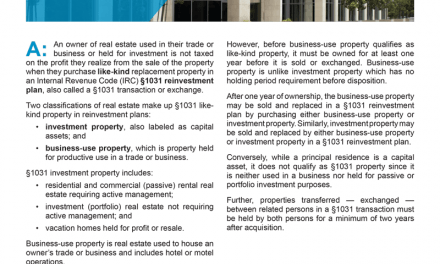What is a dual agent?
A dual agent is a broker who simultaneously represents the best interest of opposing parties in the same transaction, e.g., both the buyer and seller concurrently. [CC §2079.13(d)]
Dual agency has always been proper brokerage practice. It is a situation that arises naturally in the course of representing buyers and sellers. However, the existence of a dual agency is to be promptly disclosed to each client.
A broker who fails to promptly disclose their dual agency status at the moment it arises is subject to:
- the loss of their brokerage fee;
- liability for their principals’ money losses; and
- disciplinary action by the Department of Real Estate (DRE). [Calif. Business and Professions Code §10176(d)]
Undisclosed knowledge
When a dual agency is established in a one-to-four unit residential sales transaction and both parties are represented by the same broker, the broker may not pass on confidential pricing information to the opposing parties. For example, when the broker is a dual agent, the broker and their agents may not tell the seller the price the buyer is willing to pay, or tell the buyer the price the seller is willing to accept.
Confidential pricing information is to remain the undisclosed knowledge of the dual agent, unless authorized to release the information in a writing signed by the principal in question. [CC §2079.21]
The decision by the broker not to release pricing information needs to be made and maintained from the moment the dual agency arises – the same moment the dual agency is disclosed.
Dual agency and diminished benefits
A broker owes their client the duty to pursue the best business advantage legally and ethically obtainable. However, by nature, the dual agent is prevented from actively achieving this advantage for either client. The dual agent cannot take sides with one or the other during negotiations. A natural inability exists to negotiate the highest and best price for the seller, and at the same time, negotiate the lowest and best price for the buyer.
Generally, clients of a dual agent do not receive the full range of benefits as they would from an exclusive agent. This holds true even if different agents employed by the same broker each work with different parties to the same transaction.
The legal agent for a buyer or seller in a transaction is the broker who employs the agents involved handling negotiations. It is not the broker’s agents who are in contact with the clients. In-house transactions which involve the broker as a dual agent make it particularly difficult for the broker to properly oversee and supervise negotiations.
Typically, one agent employed by the broker enters into an exclusive sales listing with a property owner. At the same time, another agent employed by the broker works separately with a buyer to locate qualifying properties, providing information on properties listed with other brokers.
The broker becomes a dual agent the moment this buyer is exposed to a property that is the subject of an in-house listing.
However, an improper tendency in transactions involving only one broker and two of their agents is to automatically assign the broker as a dual agent. The buyer may be a party to whom only general duties regarding property disclosures are owed by the broker and their agents. Thus, no specific agency duties are owed the buyer and a dual agency does not arise.

















